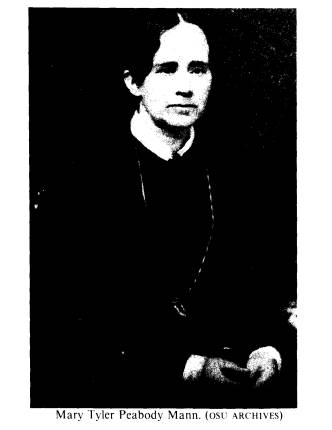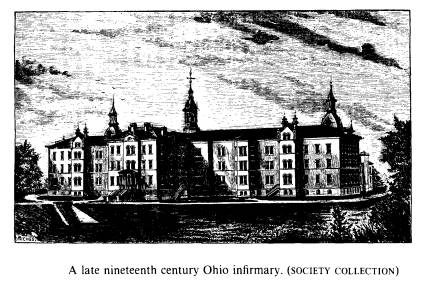Ohio History Journal
edited by
FRANK R. LEVSTIK
Life Among the Lowly:
An Early View of an Ohio Poor House
The care of the poor in Ohio during the
early nineteenth century was
largely based on English legislation of
the sixteenth, seventeenth, and
eighteenth centuries. In 1795 statutes
of the Northwest Territory provided
a means whereby the poor could be
employed through a system of annual
farming-out to the lowest bidder. The
"farmers" were thus authorized to
keep the poor at moderate labor. For the
next two decades, various
modifications on this plan were used for
the care of the destitute. By virtue
of an Act of February 26, 1816, Ohio
counties received authorization to
establish poor houses wherever it seemed
"proper and advantageous." The
creation of the county poor house, or
indoor relief system, moved with the
tide of immigration, general economic
conditions and the rise in the
numbers of the helpless and destitute.'
In one Ohio county, Greene County,
implementation of the 1816 act did
not take place until 1827. During that
year. county officials purchased a
hundred acre tract, a mile and one-half
west of Xenia. where a brick
building sixty feet long and eighteen
feet wide, and one story tall was
erected to provide for Greene County's
indigent populace. Less than two
decades later, the county's needs
required replacement of the structure. In
1840 Greene County built a two-story
brick structure forty-by-one hundred
feet to replace the older building.
Subsequently, a wing was added to the
building, and then a structure for the
confinement of the mentally ill.2
Records of conditions in Ohio poor
houses prior to the Civil War are
rare so that a letter on the Greene
County Infirmary and its conditions
addressed to Governor Salmon P. Chase is
extraordinarily enlightening.
The following letter, reproduced in its
entirety from the Salmon P. Chase
Papers in the Archives-Manuscripts
Division at the Ohio Historical
Society, provides a fresh look into the
loathsome state of the poor house
Frank R. Levstik is the State Archivist
of Ohio.
1. Aileen E. Kennedy, The Ohio Poor
Law and Its Administration (Chicago, 1934), 19,
20. 32.
2. R. S. Dills, History of Greene
County (Dayton, 1881), 305.
|
Ohio Poor House 85 |
|
|
|
where the sick, aged, disabled, orphaned, insane, and idiots were common- ly confined. The author, Mary Tyler Peabody Mann, was born November 16, 1806, in Cambridge, Massachusetts, the daughter of Nathaniel and Elizabeth Peabody. Her sisters were Sophia Peabody Hawthorne, wife of Nathaniel Hawthorne and Elizabeth Peabody, reformer and educator. Growing up in Salem, Massachusetts, she left home at eighteen to teach school in Maine. She returned to Boston to assist her sister Elizabeth in the operation of a school for young children. In 1832, while living at the boardinghouse of Rebecca Clarks, Mary met Horace Mann, a fellow boarder, attorney, widower and state legislator. She continued to teach and by 1839 assisted Mann in educational reform, writing letters and copying statistics. They were married May 1, 1843, honeymooning with Samuel Gridley and Julia Ward Howe. Upon their return they settled in Boston and later West Newton, Massachusetts. |
86 OHIO HISTORY
In 1853 Horace Mann accepted the
presidency of Antioch College in
Yellow Springs. Ohio. Mrs. Mann moved
the family west, ably filling the
role of president's wife and confidant.
The monotony of life in small town
Ohio no doubt gave impetus to the
necessity of investigating the human
condition at the nearby county poor
house. Following her husbands' death
in 1859. Mary and the family returned to
Massachusetts where she became
associated with kindergarten education,
later authoring several books.
including the three volume Life and
Works of Horace Mann. She died
February 11, 1887, in Boston,
Massachusetts, of chronic bronchitis.3
The spelling, punctuation, and sentence
structure are presented as they
originally appeared.
* *
*
Dec. 16, 1858
Yellow Springs, Ohio
His Excellency
Governor Chase
Dear Sir
Perhaps I should make an apology for
intruding upon your special
notice a subject that has been given
into the hands of a commissioner by
your authority.4 My apology
must be my conviction that I can give you
more precise information than any such
commission as this for obvious
reasons, the chief of which is that I am
a woman, and women understand
best the interests of houses and
household arrangements and I allude to the
subject of County Poor Houses or
Infirmaries as they arejustly called, and
as they should be considered. In company
with other ladies, I have visited
the Infirmary of this County several
times this fall, and my repeated
observations induce me to pronounce a
disgrace to a civilized community. I
am told, however, that this is as good
as such houses genrally are in Ohio!
We found not a single able bodied, &
scarcely a single able-minded person
in this infirmary, except one old lady
who has been thrust into it by her
sons, who have wronged her out of
property & driven her there by cruel
treatment. The care of this old lady has
excited our sympathy to such a
degree, that we are making arrangements
to remove her into a private
family in this place, & support her
by private charity, all appeals to her
children being utterly disregarded. The
poor old lady, of good benevolent
character & well respected by all
her neighbors, now 86 years old. & only
3. The biographical data on Mary Mann
was obtained from a sketch in Edward T. James.
Janet W. James and Paul S. Boyer's Notable
American Women 1607-1950: A Biographical
Directory (Cambridge, Mass.. 1971), I1, 488-89.
4. An Act of April 17. 1857, asked the
Governor to appoint a Commissioner to examine
the reports of county infirmaries and
prepare a bill for their better regulation. Ohio House
Journal 1858. LIV. 71.
|
Ohio Poor House 87 |
|
|
|
longing to die is thrust into a very small room where there are three beds, & where inbeciles of all descriptions are her roommates-& the room situated within two rods of a frightful mad house, occupied by insane people and idiots where howling, imprecations assail her ears by night & by day. In the madhouse are confined unfortunates who might all be made comfortable and orderly by proper care and arrangements, but they are taken care of by another inmate of the Infirmary who is the only person physically able & willing to do the work and she is hardly able, & very tyrannical. We had visited and talked with these unfortunates and made some happy by giving them employments-but the superintendents family who are well intentioned are so ill paid that they cannot afford to take proper care for the aged, insane or sick-The attending physician gives sad accounts of evils he cannot remedy, & I am told by good citizens of Xenia that former physicians have also complained and remonstrated in vain, & some have declined attending, because they could not cause any changes. They now prepare to build another infirmary,5 nearer to the city, where the citizens can easily visit it & make some reforms but in the State of Ohio, County Infirmaries ought to be not less than good Hospitals, with sufficient attendance and expenditure to meet the case-a good tranquil home to the destitute aged, a hospital for the sick, a school for the children. Here the meals are but two a day & those scanty & weighed out-no milk ever finds its way to the table, the Superintendent owns seven cows-but he makes butter to eke out his own scanty salary, which is but $400.00 for all
5. The new infirmary was not built until 1870. |
88 OHIO HISTORY
the care of a farm of one hundred acres,
which he must stock himself,
unaided, for the maintenance of fifty or
sixty people. A stagnant marsh
close by causes much illness &
almost yearly deaths. Children base-born
and ignorant run wild & untaught,
& listen to the worst of language &
sights of tyranny & oppression to
the unhappy insane. I have been there
many times & staid many hours, &
have lost happiness and sleep by it. Such
things ought not to be. I wish women
could have some part in arranging &
directing such places. Why cannot
visiting committees of county poor
houses be composed of women? There are a
dozen here & in Xenia who
would willingly serve on such a
committee-The physician says the
commissioners go down there and see only
the outside of things-and think
chiefly of doing the thing in the
cheapest manner. They farm out the
stewardship but the present occupants,
who have done better than former
ones & who ought to be retained on
generous terms for all the efforts they
have made, tell me they cannot renew
there engagement there on such
terms. And they ought not.6 1
am told that Judge (name indecipherable) is
the special commissioner appointed for
this work, and that something is to
be done about it in the next
Legislature. I do not know the gentleman, but I
wish he would interest ladies in all the
counties to visit the respective poor
houses, & give him the fruit of
their observations. I have thoughts of
writing & insisting in some wide
spread paper an appeal to the women of
the state to interest themselves
voluntarily in the matter during the next
month, & to present a condensed
memorial to the legislature at the next
session. Do you think this would be
judicious?7
We hope to see you some day or days when
you can escape again & give
up a little time to friendship. It would
refresh us amazingly.
With much regard,
Mary Mann
6. An Act of the General Assembly in
1882 created a Board of County Visitors to examine
and inspect county institutions. The
Judge of the Court of Common Pleas could appoint five
members, three of them women to
visitjail, prison, infirmary, and children's home. The Board
was to file reports and make
recommendations as to the quality of care.
7. On January 23, 1858, Governor Salmon
P. Chase deferred appointment on the
expectation of returns from counties, Ohio
House Journal(appendix), LIV, 39. On January3,
1859, Governor Chases' message to the
General Assembly noted ". . that the Commission-
er appointed under the act of your
predecessors. . has as yet been unable to fufill the duty
imposed by his appointment." Ohio
Executive Documents 1858. pt. 2. 87.

